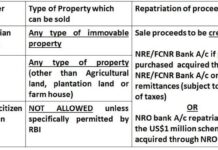Indian promoters of insurance joint ventures with foreign partners will no longer be able to nominate a majority of the board members, as per new rules notified under the Insurance Act. The rules come into effect following recent amendments to enhance the foreign direct investment (FDI) limit in insurance from 49% to 74%.

However, a majority of board members and key management persons (KMP) need to be Resident Indian citizens, as should at least one of the three top positions — the chairperson of the board, managing director and the chief executive officer.
This new norms will apply to all insurers, irrespective of the stake held by the foreign partner, said legal experts. The Finance Ministry has also specified further conditions on the composition of the board of directors for firms in which foreign investors’ stake exceeds 49%.

“In an Indian insurance company having foreign investment exceeding 49%, not less than 50% of its directors shall be independent directors, unless the chairperson of its board is an independent director, in which case at least one-third of its board shall comprise of independent directors,” as per the Indian Insurance Companies (Foreign Investment) Amendment Rules, 2021, notified by the Finance Ministry.
“The significant change introduced is the deletion of the requirements pertaining to Indian ownership and control, irrespective of whether the insurer has majority foreign ownership or not. Previously, Indian promoters or investors were required to nominate a majority of the Board. This deletion is being seen favourably by foreign investors proposing to hold stakes in insurance companies,” said Shailaja Lall, partner at law firm Shardul Amarchand Mangaldas & Co.
“However, the requirement to have a majority of the board and KMP comprised of Indian resident citizens will mean that foreign investors will have to continue to rely on Indian citizens who are resident in India to man key roles in the insurance company and its board. Therefore, while the FDI limit in insurance companies has been increased to 74%, the government has sought to provide adequate protection for insurance companies,” she added.

While the rules are a step forward for enabling fresh investments in the insurance sector, more changes are needed before transactions can begin. Further amendments are now expected in Foreign Exchange Management (Non-debt Instruments) Rules, 2019 and IRDAI guidelines on Indian ownership and control, PwC said in a regulatory note.
“The Rules are identical to the draft rules which were published by the Central government and it appears that none of the suggestions made by various industry bodies have been accepted,” noted Ms. Lall, stressing that the Consolidated FDI Policy would also need to be amended to enable the increase in FDI from 49% to 74% under the automatic route to become effective.
Onerous requirements have also been stipulated on the retention of net profits linked to the insurer’s solvency margin and dividend payment plans, where foreign players’ stake is over 49%. Such firms will have to retain 50% of their net profits in General Reserves if they propose to pay dividends on equity shares in any financial year that the prescribed solvency margin is not met.










